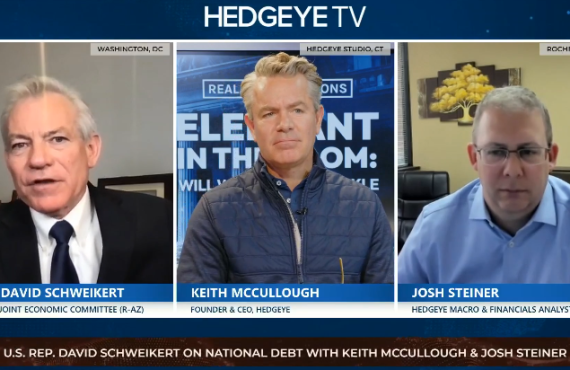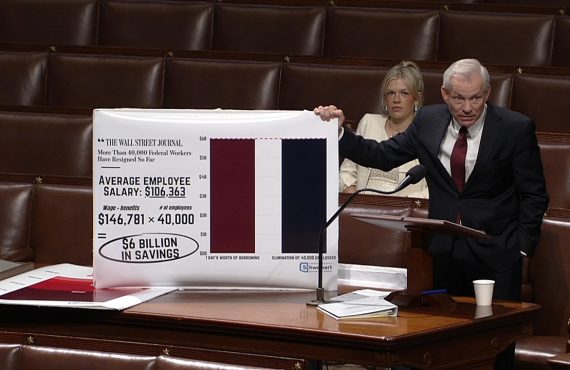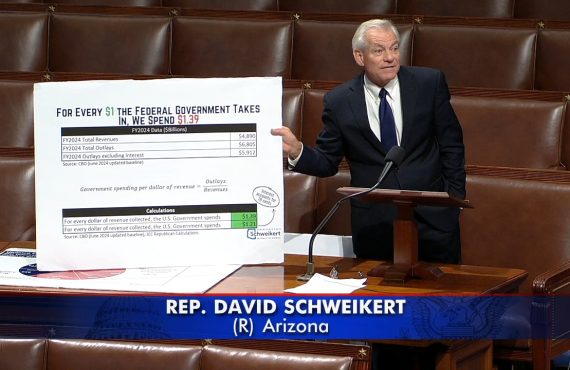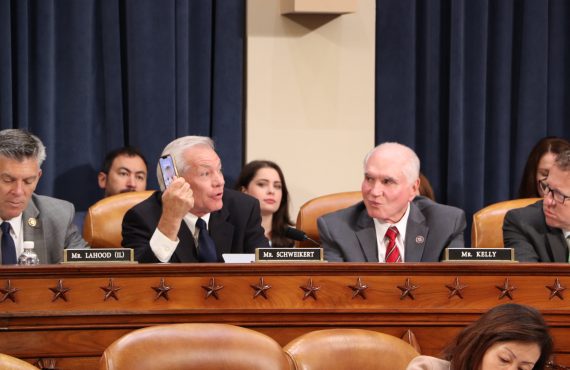Cato influences JEC’s clear-eyed assessment of America’s fiscal situation The Republican section of the 2025 Joint Economic Committee (JEC) report presents a…
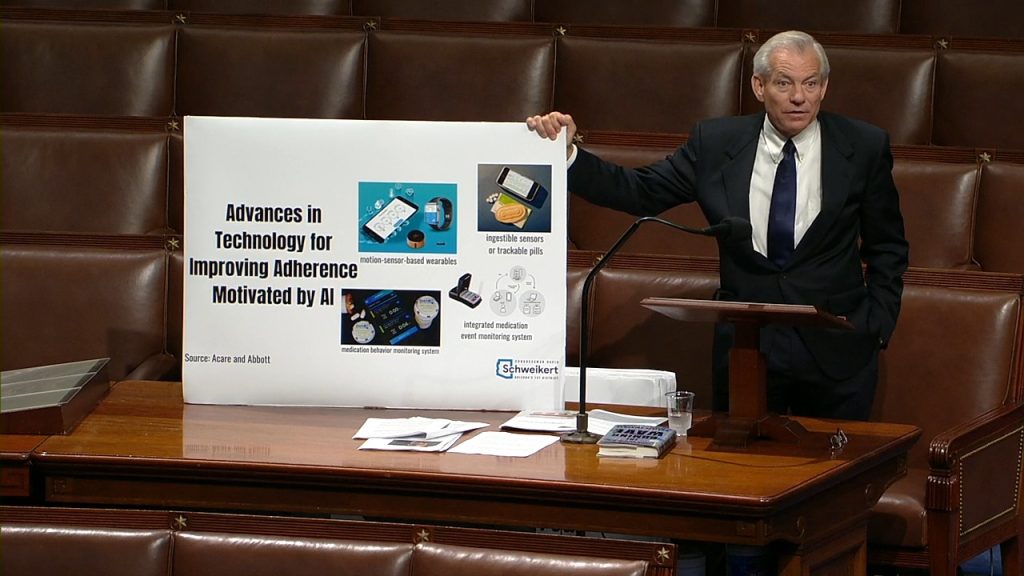
I’ve done presentation after presentation for presentation on how you could crash health care, how you could adopt artificial intelligence to reduce the size of this government dramatically and still have better customer service.
The broader adoption of AI can make government better, faster, and cheaper.
Many of you know my fascination with innovation and the further implementation of technology into different facets of many industries. The up-and-coming innovation is extensive, and luckily, there are thousands of scholarly studies and research pieces being released daily that expand on progress of these projects. Not enough members of Congress take the time to capitalize on how these innovative advancements actually promote the health and well-being of our society.
Technology has to be part of the way we bend the borrowing and debt curve. AI technologies can enhance everything from diagnostics to front and back office medical operations, such as automating the process of filling out a patient intake form. The next step is understanding how this type of technology fits into everything from building medical records, tracking you, helping you manage any pharmaceuticals you use for your heart issues, even down to producing data sets for your cardiologist to remotely look at your data. It’s here, we now just have to build the infrastructure around it; the technology is starting to move much faster than our regulatory rules.
See below to find some more information on legislation I’ve introduced to incentivize further innovation:
H.R.7827, the Substance Therapy Designation Act
This legislation would allow for solutions targeting opioid, cocaine, methamphetamine, and alcohol addiction to be eligible for an FDA breakthrough therapy designation. The designation significantly expedites the development and review of such treatments. On top of that, the bill ensures that the designation process for such treatments receives an even further fast-track.
Arizona has seen an immense increase in fentanyl coming across its border with Mexico illegally since the climax of President Biden’s border crisis. Just within the Nogales sector, Customs and Border Protection has seized over 8.5 million fentanyl pills since December 2023.
In a report put forth by the Arizona Department of Health Services, the total cost for opioid-related hospitalizations was $2.2 billion in 2022. In fact, the Arizona Republic reported back in 2022 that fentanyl was the most common component in many Arizona opioid overdoses. In Maricopa County, an average of three deaths occur per day due to fentanyl overdoses.
H.R.8832, the Maintaining Innovation and Safe Technologies Act
One June 30, the House Ways and Means Committee passed H.R. 8832, the Maintaining Innovation and Safe Technology Act— legislation that would direct the Department of Health and Human Services (HHS) to establish reimbursement guidance for remote monitoring devices that use AI to treat patients. Automating the organization and collection of patient information has proven to ease burdens off of physicians, detect health irregularities quicker, and provide hundreds of millions of dollars in savings each year. The potential for wearable devices to save American lives and American dollars is expanding, and it’s time for coverage to reflect that. Researchers have estimated that the further implementation of artificial intelligence into our health care system could produce savings from 5% to 10% of spending, which equates to around $200 billion to $360 billion annually in 2019 dollars. Forbes has also estimated that promoting the use of health-monitoring wearable devices could result in $200 billion in cost savings over the next 25 years. Most of you know that my fascination with AI integration has been ever-present. I highlighted research presented by the Joint Economic Committee’s findings showing the return on investment that comes from implementing innovation further in our health care system. Currently, the FDA has approved over 882 devices that use AI or machine learning to treat, diagnose, and care for patients.
See below for more examples of how AI technology is continuing to promote cost savings and life-saving support for Americans:
· New FDA-approved bionic pancreas uses AI to help type 1 diabetes patients
· Annalise.ai Receives FDA Clearance and Breakthrough Device Designation
· AI-developed blood test can predict Parkinson’s seven years early
· Apple Watch’s afib-tracking app certified by FDA for use in clinical studies
H.R.8929, the User Data Protection Act
To prohibit digital platforms from using information about a user unless the user consents to such use, to ensure personal information is considered a property right, and for other purposes.
This is legislation that establishes requirements for websites and other digital platforms that collect and store information about their users, including information saved to a web browser to track a user over time.
According to Centraleyes, the state of Arizona has yet to implement comprehensive consumer privacy regulations.
- This bill establishes requirements for websites and other digital platforms that collect and store information about their users, including information saved to a web browser to track a user over time (i.e., cookies).
- Specifically, a website may not (1) use cookies or otherwise collect information about a user without the user’s consent, (2) restrict access to the website if a user declines such consent, (3) use pixel-sized images that are hidden or embedded in a web page that collect data about a user (i.e., tracking pixels), or (4) share a user’s information with other websites or online businesses.
- Further, if a user consents to the collection of information, the website must (1) disclose to the user what the information will be used for, and (2) treat any such information as an exclusive property right owned by the user.
- The bill provides for enforcement of these provisions by the Federal Trade Commission, state attorneys general, and private right of action.
H.R.8283, the Clean CLAIMS Act
The CLEAN CLAIMS Act, that would establish a demonstration program through Section 1115 waiver authority to test the efficacy of real time, artificial intelligence powered claims development tools. The goal is to move away from the current “pay and chase” and long processing time for the claims appeal process at CMS. As it’s currently written, 500 practitioners (volunteer/opt-in) would learn how an AI processing platform (example: https://mccremitone.com/) works to record their physician/patient encounters. The technology would then submit a clean claim to CMS for payment.
- The goal of the legislation to allow CMS to adopt the model of the demonstration program to expedite the Medicare Claims process using AI.
- In 2023, Medicare improperly paid out $31.2 billion
H.R.7827, To direct the Secretary of Defense to ensure that the audit of the financial statements of the Department of Defense for fiscal year 2024 is conducted using technology that uses artificial intelligence, and for other purposes. (Algorithms Utilized to Detect Institutional Transactions (AUDIT) Act)
This legislation ensures the audit of the Department of Defense’s financial statements is conducted using artificial intelligence to help streamline the internal review process and usher in a new era of audit.
The Pentagon, with its 2.9 million employees and over half a million assets worth $3.8 trillion, faces significant challenges during audits. In 2019, the cost of the Department of Defense’s audit was $428 million, and correcting errors post-audit added another $472 million to the total cost. Despite six consecutive years of self-auditing since 2018, the Defense Department has yet to achieve a clean financial audit. The 2023 audit, which required 1,600 auditors and 700 site visits, cost $187 billion and received a “disclaimer of opinion” rating due to insufficient financial information provided to auditors. My serious solution emphasizes the importance of implementing innovative auditing tools, reducing costs, and enhancing government accountability.
Typically, Pentagon personnel must count every single piece of inventory — from military equipment, to supplies, and even property. In 2019, DOD’s audit cost was $428 million. On top of that, add another $472 million to the total cost to account for the errors encountered after the audit was conducted. The Defense Department has failed to achieve a clean financial audit for six consecutive years. The 2023 audit required 1,600 auditors and 700 site visits to complete, costing $187 billion and earning a “disclaimer of opinion” rating, meaning DOD couldn’t provide enough financial information to auditors so they could form an opinion. The federal government has spent nearly $1 billion annually trying to audit the Department of Defense. This legislation helps accelerate the adoption of innovative auditing tools to reduce costs and foster creative solutions that will increase government accountability. This is common-sense legislation that will only help modernize how Congress conducts such oversight in order to protect hardworking taxpayers.
H.R.7147, the Medicare Transaction Fraud Prevention Act
Technology has to be part of the way we bend the borrowing and debt curve. The broader adoption of AI can make the government better, faster, cheaper. Medicare loses approximately $60 billion annually due to fraud, errors, and abuse involving both predatory healthcare professionals and anonymous organized criminals. In total, traditional Medicare is billed $7 billion dollars for DME. From 2020 to 2023, DME billing in Medicare Advantage increased by 59 percent. These companies charge Medicare beneficiaries for unapproved diagnostic tests and fraudulently bill them for wheelchairs, braces, and other Durable Medical Equipment (DME) products in order to obtain Medicare reimbursements. This fraud drains the Medicare trust fund and can burden beneficiaries with expensive copayments that they cannot afford. By constantly changing their tactics, these scammers remain largely undetectable to CMS.
That is why I introduced the Healthy Technology Act. The bill would establish AI or machine learning technology may be eligible to prescribe drugs. Currently, certain drugs may be dispensed only upon a prescription provided by a practitioner licensed by law to administer the drug. Under this bill, an AI or machine learning technology may qualify as such a prescribing practitioner if the technology is (1) authorized by state law to prescribe the drug involved; and (2) approved, cleared, or authorized under certain federal provisions pertaining to medical devices and products.
H.R.6731, the FORWARD Act of 2023 (Finding Orphan-disease Remedies with Antifungal Research and Development)
The FORWARD Act is designed to one day eliminate Valley Fever by:
- Authorizing $500,000,000 to support public-private partnerships to prevent and slow the spread of Valley fever infections.
- Streamlining the process to approve new vaccines and treatments for Valley fever.
- Establishing a working group at the Department of Health and Human Services to advise on strategies that confront gaps in science that can help detect, treat, and eradicate Valley fever.
Background:
In 2013, Rep. Schweikert and former Speaker McCarthy co-founded the Valley Fever Task Force, with the goal being to share information with stakeholders in the medical and scientific fields to foster new advancements in prevention and treatment as well as to work with community organizations to help educate individuals on the disease.
Arizona alone accounts for about 65% of all reported Valley Fever cases in the United States. There is currently no cure, and doctors often recommend patients take antifungal medications for life.
Symptoms of Valley Fever can include a cough, fever, muscle and joint pain, and other symptoms that mimic other common respiratory infections and illnesses, which can lead to a misdiagnosis and underreported figures to the CDC. There were just over 20,000 reported cases in 2021 — the most since 2011 — signaling that Valley Fever is on the rise.
While many cases of Valley Fever are mild, if left untreated, some cases can develop into severe fungal infections that spread from the lungs to other parts of the body and can be fatal.
In September, Rep. Schweikert and former Speaker Kevin McCarthy (CA-20) led a roundtable discussion with former NFL superstar Rob Gronkowski and Anivive Lifesciences at the U.S. Capitol to talk about the devastating effects of Valley Fever and receive an update on the status of preventative treatments.
In the 117th Congress, Rep. Schweikert and former Speaker McCarthy introduced the FORWARD Act, bipartisan legislation to support research initiatives to treat Valley Fever.
H.R.6227, Adding Coccidioidomycosis to the FDA Priority Review Voucher Program Act of 2023
The proposed research centers will focus on increasing collaboration in investigating diagnostics, treatments, and vaccines.
H.R.3991, Small Business Paperwork Savings Act
This legislation increases the Form 1099 reporting requirement threshold from $600 to $5,000 to account for cost-of-living adjustments since 1954, when the $600 threshold was first established in the Internal Revenue Code.
For nearly 70 years, small businesses have had to put up with burdensome and unnecessary tax compliance for payments that exceed $600 over the course of a year without any adjustment for inflation despite median family income being over 21 times higher today.
Think about how many times we pay independent contractors for various services — plumbing, landscaping, photography, cleaning or repairs. It wouldn’t take much to eclipse that $600 threshold and bury hardworking Americans under a mountain of burdensome paperwork. Employers should be focused on creating jobs and growing their businesses instead of drowning in paperwork and bureaucratic red tape. This legislation creates a better climate for job creation and lifts this incredible burden off our small businesses, and I was pleased to see the Ways and Means Committee include it in their signature tax relief package.
H.R.207, Advanced Safe Testing at Residence Telehealth Act of 2023
This legislation expands access to innovative health care technologies and reduce health care costs.
The COVID-19 pandemic revealed just how valuable access to health care technology can be, and I am proud to build upon its advancements. The A-START Act would accelerate the enormous achievements recently made in expanding telehealth, diagnostics, screening, wearables, and patient monitoring technology. Patients deserve access to the best information and data that modern technology can provide, to make informed decisions about their health.
Background:
- This legislation would establish Medicare Advantage, Medicaid, and Veteran Affairs demonstration programs to test the efficacy and full potential of modern telehealth tools.
- Under A-START, patients will have access FDA approved technology and devices such as remote patient monitoring, wearables, diagnostics, tests, software as a medical device (SaMD), and more from the comfort of their home.
- To read a one-pager on the A-START Act, click HERE. To read the full text of the A-START Act, click HERE.
H.R.206, Healthy Technology Act of 2023
Technology has to be part of the way we bend the borrowing and debt curve. The broader adoption of AI can make the government better, faster, cheaper. The National Bureau of Economic Research estimated that the further implementation of artificial intelligence into our health care system could produce savings from 5% to 10% of spending, which equates to around $200 billion to $360 billion annually in 2019 dollars. Forbes has also estimated that promoting the use of health-monitoring wearable devices could result $200 billion in cost-savings over the next 25 years.
Currently, the FDA has approved over 882 devices that use AI or machine learning to treat, diagnosis, and care for patients. In 2019, Medicare expanded coverage for remote patient monitoring (RPM). From February 2020 to September 2021, general RPM use per month increased from 91 to 594 claims per 100,000 enrollees– an increase of 555%. AI has streamlined many processes for physicians, patients and hospitals, like early diagnostics/detection, analyzation of comprehensive data sets, and medication management.
That is why I introduced the Healthy Technology Act. The bill would establish AI or machine learning technology may be eligible to prescribe drugs. Currently, certain drugs may be dispensed only upon a prescription provided by a practitioner licensed by law to administer the drug. Under this bill, an AI or machine learning technology may qualify as such a prescribing practitioner if the technology is (1) authorized by state law to prescribe the drug involved; and (2) approved, cleared, or authorized under certain federal provisions pertaining to medical devices and products.
H.Amdt.956, An amendment numbered 44 printed in Part B of House Report 118-535 to increase and decrease funding by $10 million to conduct a study on the benefits of utilizing artificial intelligence (AI) to streamline oversight, mitigate and reduce fraud, and improve data accuracy and financial management practices at the Department of Veterans Affairs.
H.Amdt.955, An amendment numbered 43 printed in Part B of House Report 118-535 to increase and decrease funding by $1 million for the Veterans Benefits Administration to provide support for utilizing AI to expedite claims.
H.Amdt.805, An amendment numbered 139 printed in Part B of House Report 118-272 to increase funding by $2 million for the CDC “Emerging Zoonotic and Infectious Disease” account with the intention that these funds be used for Coccidioidomycosis otherwise known as “Valley Fever.” Offsets the increase with a decrease in funding of $2 million from the General Departmental Management account under the Office of the Secretary of Health and Human Services.
Amendment No. 985, ensures the audit of the Department of Defense’s financial statements is conducted using artificial intelligence to help streamline the internal review process. The amendment also mandates that the technology be developed by both the Secretary of Defense and Inspector General of the Department of Defense.
The Defense Department has failed to achieve a clean financial audit for six consecutive years since it first started auditing itself in 2018. In fact, certain publications have stated that “it’s no surprise” the Pentagon has yet to achieve an independent audit, noting the lack of adequate information obstructing a comprehensive accounting evaluation.
Amendment No. 1010, requires the Undersecretary of Defense (Comptroller) to conduct a study and a report to Congress on the potential cost-saving measures of incorporating artificial intelligence (AI) and multi-domain, attributable autonomous, semi-autonomous, unmanned systems, capabilities and processes into each branch of the military and its civilian workforce within 90 days of enactment.
The Pentagon employs 2.9 million people and has over half a million assets worth $3.8 trillion, while its liabilities total $4 trillion. The 2023 audit required 1,600 auditors and 700 site visits to complete, costing $187 billion.
In 2019, DOD’s audit cost was $428 million. Correcting the errors after the audit was conducted added another $472 million to the total cost.
This requires the Secretary of Defense to retire outdated financial management systems, and instead, replace said systems with innovative technologies adopted by the Secretary.
Additionally, other federal agencies who have integrated AI machinery have saved hundreds of thousands of labor hours, improved the auditability of business processes, and found millions of dollars available for de-obligation.




